Search results for tag "Imperious Self" - 10 answer(s)
163
Vote
After reflecting on the question of God and what “putting one’s faith in that One” truly means, we continue here our series on Ostad Elahi’s poem “The Quintessence of Religions” with a second excerpt from Leili Anvar’s commentary of this text, which was originally published (in French) in the proceedings of the symposium “Quelle sagesse pour notre temps ?”. This second excerpt examines the question of “evil”.
Read more
226
Vote
According to Ostad Elahi’s model of the self, we are bi-dimensional beings. We carry within ourselves a celestial part that, combined with our animal terrestrial part, forms our humanity. It is within this intimate combination—perhaps best compared to fertilization (when two gametes, or sexual cells, one male, the other female, unite to form a new zygote)—that our psychological and spiritual personality is forged. It is a crucible for our character traits and for the powers within us. In this equation, also lies the enigma of free will, in other words the question of evil
Read more
423
Vote
“A snake-catcher went to the mountains to catch a snake by his incantations…”. Using this tale recounted by the Persian mystical poet Rumi as a starting point, Leili Anvar introduces here the notion of imperious self.
The imperious self is a central concept in Ostad Elahi’s philosophy. It is this product of the human psyche against which we must relentlessly struggle in order to make spiritual progress, for it is the origin of those of our impulses that systematically and insidiously arise to contradict correct ethical thoughts.
Read more
266
Vote
This article was written by Scr, a regular contributor to the e-ostadelahi website. It gives an account of what ethical practice can be like for those who seek to progress on the path of perfection. The two everyday scenarios presented here help provide insight into our actions and thoughts. Whether we share the author’s conclusions or not, his approach is in our opinion worthy of interest; it is an introspective self-analysis that results in an awareness of one’s emotions—a stepping stone toward ethical readjustments of our thoughts and behaviour.
Read more
236
Vote
Family life is filled with delights and annoyances that are felt particularly deeply within the couple itself. The hypothetical case study of “Jack and Kelly” offers an illustration that many of you have commented on. What if living together provided a sort of ethical laboratory for each of the partners? This is the idea proposed in the following text. In order to develop this hypothesis, the author of the article briefly recalls the conditions for a successful practice of ethical principles, as well as the operational modes of the imperious self according to Ostad Elahi. Then you will be invited to give further thought to the matter by taking part in a quick poll based on your own personal experience.
Read more
844
Vote
Why does self-knowledge matter? How and why is it connected to the practice of ethics? Elie During, Associate Professor in the Philosophy Department of the University of Paris – Ouest Nanterre, addresses these questions in an article published in a special issue of the Annals of the New York Academy of Sciences entitled “Perspectives on the Self”.
In the following excerpt, the author examines Ostad Elahi’s concept of the “imperious self”, emphasizing the importance of self-modeling in the process of self-transformation.
Read more
566
Vote
If ethics is about principles, practicing ethics is about method. In this field, we can assume that not just any method will do. So we have to figure out which method will be the most efficient to get us closer to our goal of progressing towards spiritual perfection.
For the purposes of this post, I will assume that the reader is familiar with the various psychological forces at play in the paradigm of the process of perfection, and in particular with the concept of imperious self (IS), which may be defined as an impulsive force systematically opposed to spiritual progress. The IS is protean—it creeps in through the cracks created by our moral faults or lack of attention. It takes on different looks depending on the person and the circumstances. One day it will oppose itself to your spiritual work head-on, and the next, like a chameleon, it will pass itself as a spiritual thought and deceive your reason.
Read more
1643
Vote
Ostad Elahi used to define his teachings as a new medicine of the soul: one that is adapted to the true nature of human beings and adheres to the law of causality governing both their spiritual and material lives. The spirituality he practiced was natural spirituality, and he considered the process of spiritual perfection to […]
Read more
396
Vote
The process of self-perfection, for Ostad Elahi, consists mainly in practising ethics. If I wish to perfect myself, I must see to it that the way I behave and whatever I do, say, or even think, be ethical. That sounds gigantic; it is, however, what we should be heading for. After all, perfecting oneself means nothing other than striving to achieve such a high goal. Having actually started practising, very soon we come to realise that ethical work involves, in the first place, battling against oneself. To work means to make efforts.
Read more
229
Vote
In brief: in Ostad Elahi’s model of the self, the imperious self is the source of impulses within the psyche that imperiously drive us to act against ethical and divine principles and to violate the rights of others. Let us illustrate this with an example from everyday life. The following is Romain’s account of an […]
Read more
« Prev
|

 News
News Podcast
Podcast



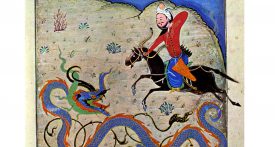
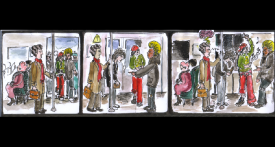

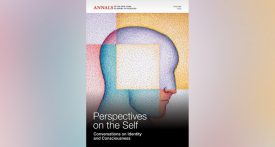

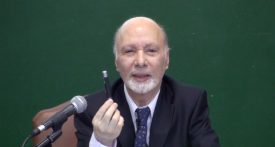

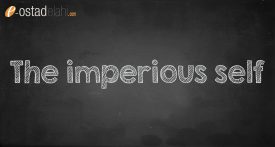


Recent Comments